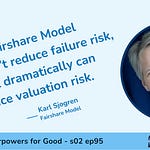Devin: What is your superpower? What do you think of as that singular strength that helps you to be so incredibly successful?
Jill: You know, I have a really good friend, Marion Fredman, who told me once when I was a young leader at my first nonprofit Museum of Children’s Art, she said, “Jill, we’re many different people in our lives.” I think similarly, we have many different superpowers. I think more recently, the superpower that has given me the most success has been my ability to convince other people of their transformative power to make the world a better place, to really contribute, to make a difference.
Jill Vialet founded the national nonprofit Playworks, which operates effective programs both during and after school across the country. She recently wrote a book, Why Play Works, about the lessons she’s learned over 25 years. Her insights demand our attention.
Jill sees play as relevant not only for healthy childhood development but also for adults. Bemoaning the current political environment in which people vilify their political rivals—often including friends and neighbors whose cars have the wrong bumper sticker or caps have the wrong slogan—she sees play as a part of the solution.
She notes that play teaches us that we need “healthy competition to get better.” Republicans challenging Democratic policies could be seen as helping to hone the principles and polish the messages to convince people of their value.
In addition, she observes that play helps get us comfortable with rules. You can’t imagine playing sports without rules. That framework helps us tolerate rules that govern work and society, too.
Jill attributes learning creativity and innovation to play. She adds that leadership is also learned that way. This is true perhaps, especially for unstructured play. Recently, she hike the John Muir Trail from Yosemite to Moun Whitney admitting that there was no structured purpose for this play but values it just the same.
One critical thing value she sites for play is its ability to teach us to manage risks. “Play is this—it's an undeniably risky behavior that has survived evolution nonetheless, partly because the way you learn to handle risk is by taking manageable risks. Play really is that that tool. People climb jungle gyms or they play hide and seek; in a lot of ways, those are just playing out, dealing with fears of heights and or being worried about abandonment.”
Having left her full-time role at Playworks during the pandemic, which sadly required a layoff in which she included herself, Jill has shifted her time and focus to academia. She now teaches at both the University of California Berkeley and Stanford.
She describes her superpower as “my ability to convince other people of their transformative power to make the world a better place, to really contribute, to make a difference.”
How to Develop the Ability to Convince Other People of Their Transformative Power As a Superpower
Jill’s leadership at Playworks is just one piece of evidence of that ability. In 1988, she founded the Museum of Children’s Art (or MOCHA) which continues to thrive today. In fact, the high school intern, Nina Woodruff-Walker, who volunteered to help Jill launch it 34 years ago is now the executive director.
Her leadership ability, including what she describes as her superpower, has left an impressive mark on her community and the country. She adds that she pairs her superpower with “my ability to get the hell out of the way.” While uttered in jest, I suspect there is a foundation of truth there.
She is also keen on holding people accountable. When Playworks earned support from AmeriCorps members, she fired one. Someone said, “You can’t fire Americorps members.” Jill describes her response as, “I’m like, Oh yes, we can.” Accountability is a partner of empowerment.
As a professor, she teaches her students a key principle, that there is not only one right answer. She invites guest lecturers with whom she disagrees to present to the students to help them develop their personal sense of mission, purpose and values. She sees this an empowering approach that will enable them to change the world.
Remembering this can help you do the same. Your vision for how you change the world should be defined by your passions and life experiences, not Jill’s—or mine.
You can change the world. And you can convince other people of their transformative power as well. With practice, this can become one of your superpowers.
















Share this post